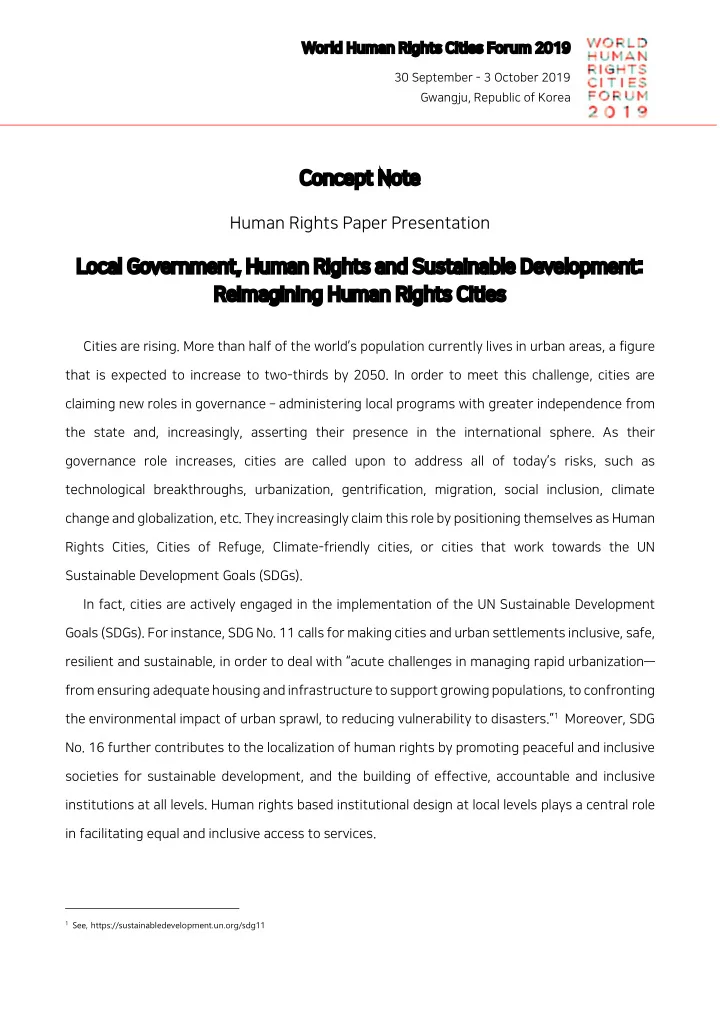

World�Human�Rights�Cities�Forum�2019� 30�September�-�3�October�2019� Gwangju,�Republic�of�Korea � Concept�Note� � Human�Rights�Paper�Presentation� � Local�Government,�Human�Rights�and�Sustainable�Development:� Reimagining�Human�Rights�Cities � � Cities�are�rising.�More�than�half�of�the�world’s�population�currently�lives�in�urban�areas,�a�figure� that� is� expected� to� increase� to� two-thirds� by� 2050.� In� order� to� meet� this� challenge,� cities� are� claiming�new�roles�in�governance��administering�local�programs�with�greater�independence�from� the� state� and,� increasingly,� asserting� their� presence� in� the� international� sphere.� As� their� governance� role� increases,� cities� are� called� upon� to� address� all� of� today’s� risks,� such� as� technological� breakthroughs,� urbanization,� gentrification,� migration,� social� inclusion,� climate� change�and�globalization,�etc.�They�increasingly�claim�this�role�by�positioning�themselves�as�Human� Rights� Cities,� Cities� of� Refuge,� Climate-friendly� cities,� or� cities� that� work� towards� the� UN� Sustainable�Development�Goals�(SDGs).� � In�fact,�cities�are�actively�engaged�in�the�implementation�of�the�UN�Sustainable�Development� Goals�(SDGs).�For�instance,�SDG�No.�11�calls�for�making�cities�and�urban�settlements�inclusive,�safe,� resilient�and�sustainable,�in�order�to�deal�with�“acute�challenges�in�managing�rapid�urbanization—� from�ensuring�adequate�housing�and�infrastructure�to�support�growing�populations,�to�confronting� the�environmental�impact�of�urban�sprawl,�to�reducing�vulnerability�to�disasters.” 1 � Moreover,�SDG� No.�16�further�contributes�to�the�localization�of�human�rights�by�promoting�peaceful�and�inclusive� societies� for� sustainable� development,� and� the� building� of� effective,� accountable� and� inclusive� institutions�at�all�levels.�Human�rights�based�institutional�design�at�local�levels�plays�a�central�role� in�facilitating�equal�and�inclusive�access�to�services.� � 1 See, https://sustainabledevelopment.un.org/sdg11
World�Human�Rights�Cities�Forum�2019� 30�September�-�3�October�2019� Gwangju,�Republic�of�Korea � The�intersection�between�the�SDGs�and�human�rights�provides�the�unique�opportunity�to�guide� priority-setting,� decision-making,� and� policy� implementation� in� cities.� In� fact,� by� creating� “a� powerful�alliance�between�human�rights�norms�and�development�goals�at�the�local�level”,�cities� could�create�the�conditions�under�which�human�rights�based�approaches�can�influence�and�shape� city�services,�responding�to�human�needs�of�local�residents. 2 � Cities�are�the�most�efficient�and� effective� body� for� utilizing� human� rights� norms� as� frameworks� for� policy� development� and� decision-making�at�local�levels.� Around� the� world,� cities� oversee� basic� services� like� water,� sanitation,� public� transportation,� public�health,�and�emergency�response�provided�to�residents�and�visitors�alike.�Cities�provide�public� spaces�for�leisure�and�self-expression.�And,�they�oversee�the�quintessential�aspects�of�democracy,� providing�spaces�for�participation�in�decision-making�(e.g.�consultation,�elections,�etc.).�In�doing�all� of�this,�and�much�more,�they�establish�rules�and�regulations�that�can�(or,�can�fail�to)�ensure�mutual� respect�for�the�rights�of�local�inhabitants�and�all�others�who�come�within�their�jurisdictions.� It�is�in�this�framework�of�increasing�participation�of�cities�in�the�implementation�of�human�rights� at�local�levels�that�the�notion�of�“human�rights�cities”�has�emerged.�The�Gwangju�Declaration�of� 2011�defines�human�rights�city�“as�both�local�community�and�a�socio-political�process�in�a�local� context�where�human�rights�play�a�key�role�as�fundamental�values�and�guiding�principles”. 3 � The� human�rights�city�concept�supports�a�process�where�local�government,�including�its�deliberative� organs,�civil�society�organizations,�the�private�sector�and�other�stakeholders�ensure�the�application� of�international�human�rights�standards. 4 � This�year’s�forum�will�explore�and�highlight�the�different�challenges�and�opportunities�that�cities� and�local�authorities�face�in�providing�access�and�implementing�international�and�constitutional� human� rights� standards.� In� addition,� the� forum� welcomes� the� exploration� of� inter-linkages,� including� both� challenges� and� opportunities,� that� the� implementation� of� the� UN� Sustainable� 2 See, https://sustainabledevelopment.un.org/sdg16 3 See, Gwangju Declaration on Human Right City, 2011 World Human Rights Cities Forum, para. 4. Available at: https://www.uclg- cisdp.org/sites/default/files/Gwangju_Declaration_on_HR_City_final_edited_version_110524.pdf 4 See, http://rwi.lu.se/the-swedish-human-rights-city-project/
World�Human�Rights�Cities�Forum�2019� 30�September�-�3�October�2019� Gwangju,�Republic�of�Korea � Development�Goals�(SDGs)�at�local�levels�could�generate�vis- á -vis�the�effective�enjoyment�of�human� rights�by�members�of�local�communities.�Studies�focusing�on�institutional�developments�of�cities� are� encouraged,� including� the� creation� of� innovative� institutional� structures� that� facilitate� the� fulfillment�of�state�authorities’�human�rights�obligations�at�local�levels.� � Call�for�papers:� The� 9th� World� Human� Rights� Cities� Forum� (WHRCF� 2019)� is� inviting� researchers,� PhD� candidates,�practitioners,�activists,�and�graduate�students�to�present�papers�related�to�the�present� call� on� “Local� Government,� Human� Rights� and� Sustainable� Development:� Reimagining� Human� Rights� Cities”.� Approved� submissions� will� be� presented� in� the� Senior� Session� (for� established� scholars,�experienced�human�rights�activists,�and�PhD�holders)�or�in�the�Junior�Session�(for�young� researchers,�rising�human�rights�activists,�and�graduate�students).� In�particular,�the�forum�encourages�the�submission�of�papers�related�to�the�following�topics:� 1.� Placing� the� notion� of� Human� Rights� Cities� in� its� theoretical/international� context� � the� impoverishment�of�contemporary�political�discourse�and�the�eclipse�of�the�nation-state�as�the�sole� international� actor� for� the� implementation� of� human� rights� obligations� within� their� national� territories;� � 2.� Assessing� the� analytical/critical� potential� of,� and� challenges� confronting,� the� Human� Rights� Cities�initiative�from�a�human�rights�perspective,�including�the�‘right�to�the�city’�and�the�future�of� urban�justice�in�balancing�distributional�equity,�social�solidarity,�and�individual�empowerment;� � 3.�Broadening�our�understanding�of�the�role�that�governmental�and�non-governmental�agents�(e.g.� local�administrators,�advocates,�activists,�human�rights�scholars,�etc.)�play�in�implementing�the� Sustainable�Development�Goals�(SDGs)�and�Human�Rights�at�local�levels;� � �
Recommend
More recommend